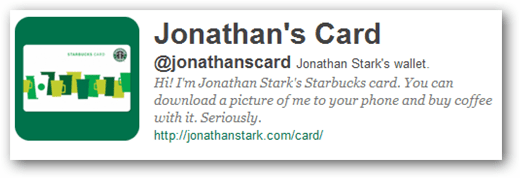 Earlier this week, Jonathan’s Starbucks card became a viral sensation, treating the masses to their morning coffee and asking for users to pay it forward as they saw fit. The good karma seemed to be working, as the card would empty and re-up throughout the day and we generally were getting warm fuzzies about the idea that there really is such a thing as collective good and that the Internet could learn to share and share alike.
Earlier this week, Jonathan’s Starbucks card became a viral sensation, treating the masses to their morning coffee and asking for users to pay it forward as they saw fit. The good karma seemed to be working, as the card would empty and re-up throughout the day and we generally were getting warm fuzzies about the idea that there really is such a thing as collective good and that the Internet could learn to share and share alike.
But then skepticism reared its ugly head. Jonathan Stark and his coffee card were labeled a Starbucks marketing ploy, despite his insistence that he is entirely unaffiliated with the brand. He explains on the card’s devoted site, “In case it wasn’t obvious from the complete lack of design, this site is totally not affiliated with Starbucks.”
Unfortunately, that statement isn’t entirely true. Stark works for Mobiquity, a mobile computing solutions firm, which at one point worked with Starbucks. Making matters more suspicious, the page featuring Mobiquity’s clients disappeared shortly after this rant was posted. And that just fueled the fire of every conspiracy theorist with an Internet connection.
Starbucks has denied any involvement with Jonathan’s Card, and Stark himself is flat out insulted by the accusations. Hey, if you started a movement based on the faith in human goodness that was then labeled little more than PR trickery, you might be upset too. In a Facebook note, Stark explains:
“The Jonathan’s Card experiment was completely my idea, Starbucks had absolutely nothing to do with it, and until recently, I was scared to death that Starbucks might sue the crap out of me. Furthermore, I’m not making any money from this project (quite the opposite, in fact) and I’m currently working out how to donate the hundreds of free coffee coupons that have been earned.
I am deeply hurt by accusations that I’ve been acting out of self-interest or on behalf of Starbucks, partly because it calls my integrity into question, but more importantly because it threatens to destroy the good feelings that have been built up by thousands of people who have participated in this wonderful experiment.”
He goes on to say he isn’t certain he can convince the doubters out there. We feel like there are a few reasons a Stark-Starbucks underground marketing campaign just doesn’t make sense, but really, the fact that Stark has a career (and a good one at that) in which lying so blatantly about a PR scheme would be fairly damaging, is enough for us to think it’s the real deal. Consumers have become pretty marketing-savvy, and jaded at that. It’s natural to immediately start connecting the dots… but in this case, we’re inclined to say it doesn’t seem like there are any.


